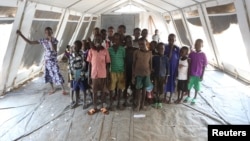United Nations Secretary-General Ban Ki-moon said on Monday he feared genocide was about to start in South Sudan unless immediate action is taken, renewing his plea for the Security Council to impose an arms embargo on the world's newest country.
"If we fail to act, South Sudan will be on a trajectory towards mass atrocities," Ban told the 15-member Security Council. "The Security Council must take steps to stem the flow of arms to South Sudan."
Noting that his special adviser on the prevention of genocide, Adama Dieng, has described genocide as a process, Ban said: "I am afraid that process is about to begin unless immediate action is taken."
Political rivalry between South Sudan President Salva Kiir, an ethnic Dinka, and his former deputy Riek Machar, a Nuer, led to civil war in 2013 that has often followed ethnic lines. The pair signed a shaky peace deal last year, but fighting has continued. Machar fled in July and is now in South Africa.
Ban said reports suggested Kiir and his loyalists "are contemplating a new military offensive in the coming days" against Machar-allied opposition troops, while "there are clear indications that Riek Machar and other opposition groups are pursuing a military escalation."
Dieng told the council last month that he had seen "all the signs that ethnic hatred and targeting of civilians could evolve into genocide," and the head of a U.N. human rights commission said the country was on the brink of an all-out ethnic civil war.
"How many more clues do you, do we all need to move from our anxious words to real preventative action?" U.N. aid chief Stephen O'Brien asked the council on Monday.
U.S. PRESSES TO "STOP ATROCITIES"
South Sudan's U.N. ambassador, Akuei Bona Malwal, on Monday said the descriptions were exaggerated and did not "reflect the reality on the ground."
"There have been no attempts, that we are aware of, on the part of the South Sudanese masses to turn against each other," he told the Security Council.
Following an outbreak of deadly violence in Juba, the capital, in July, the Security Council in August authorized a 4,000-strong protection force as part of a U.N. peacekeeping force already on the ground and threatened an arms embargo if Kiir's government did not cooperate. None of the new troops have yet deployed.
"Obstruction and defiance," the U.S. ambassador to the United Nations, Samantha Power, said of Kiir's government.
U.N. peacekeepers have been in South Sudan since it gained independence from Sudan in 2011. There are currently some 13,700 U.N. troops and police on the ground.
The United States has been struggling to secure the minimum number of votes needed for the Security Council to impose an arms embargo on South Sudan. To be adopted, a resolution needs nine votes in favor and no vetoes.
Diplomats have said that so far only seven members were in favor, with the remaining eight planning to abstain or vote no.
While veto powers Russia and China are skeptical whether an arms embargo would achieve much in a country awash with weapons, diplomats did not expect them to block the measure.
Power said she wants to put a resolution to impose an arms embargo on South Sudan to a vote before the end of the year.
"The situation is not getting better, it's getting worse, and we're sitting on our hands as a council," Power said. "We have to try to stop atrocities in South Sudan."





